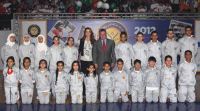 Aim: The King Abdullah II Prize for Fitness is a physical fitness promotional programme intended to complement the regular physical education (PE) curriculum for children aged 9–17 years.
Aim: The King Abdullah II Prize for Fitness is a physical fitness promotional programme intended to complement the regular physical education (PE) curriculum for children aged 9–17 years.
Location: The programme takes place in most public and private schools in Jordan, including Military and UNRWA schools. Approximately 5000 schools in total take part in the programme.
Duration: The programme started in 2006 and is ongoing.
Funding: The programme is funded by the Government. Until recently it was funded by the Royal Court of Jordan. Currently, the programme is funded by the Ministry of Education.
Lead agency: Ministry of Education.
Partners: Ministry of Heath, Royal Health Awareness Society of Jordan President Award.
Key focus
- To encourage students to participate in physical fitness activities and to improve their fitness levels.
- To encourage teachers and families to support children in their effort to improve fitness, physical activity and health.
Key components for physical activity
- Written resources, a website, and guidelines for training and fitness testing for children and adolescents, their teachers, and families.
- Classes and workshops for teachers on how to conduct fitness assessments and to how to be an official referee for the King Abdullah II Prize.
- Exercises and training sessions delivered within PE classes and after school.
- Fitness testing for children, before and after participation in an 8-week training programme.
- Financial reward (US$ 75) for all students who achieve the ‘gold’ level in all components of fitness (muscular endurance, aerobic, flexibility, agility and speed).
- Fitness classification for schools based on the collective fitness of the pupils.
Evaluation
Evaluation of the programme is largely based on the number of participating schools and the fitness levels of pupils.
Key findings
- The number of schools participating in the programme is increasing each year.
- Approximately 5000 schools and 600 000 pupils have taken part in the programme.
- The programme has been well accepted by students, students’ families, teachers and schools.
Key factors contributing to the success of the project
- The involvement of pupils’ families.
- The competition and financial reward helped to motivate pupils.
- The final ceremony was conducted under the patronage of His Royal Highness the King, which was an incentive for many school administrators and teachers to participate.
Challenges
- The definition of the ‘levels’ of fitness are currently based on American standards rather than a national standard.
- The integrity of some of the referees is questionable and it is believed that some fitness results may have been ‘fixed’.
- More funding is needed to support a range of gifts and (non-financial) incentives for pupils.
- The financial reward for students achieving the gold level in all components of fitness has been removed this year, due to financial constraints, which may have a negative impact on participation rates.








